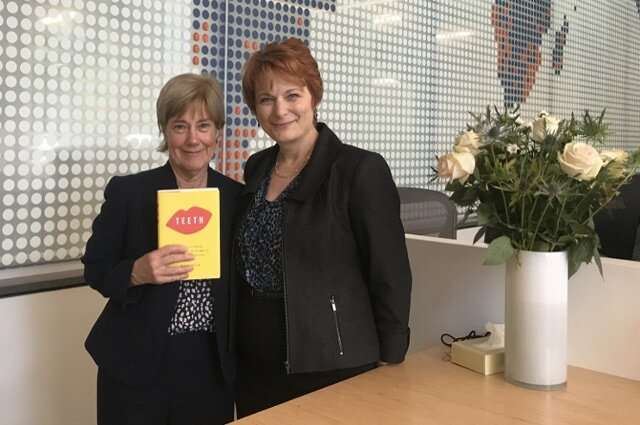“Health-care stories tell us the deepest things about our human journey,” said Mary Otto, with Ellen Patterson, assistant professor of comprehensive care and director of behavioral science education at the School of Dental Medicine. Credit: Naomi Braude
In 2007, a 12-year-old boy from Maryland died after an infection from an untreated dental abscess spread to his brain. His mother, homeless and dependent on Medicaid, had been unable to find a dentist to treat her children's decaying teeth.
Mary Otto, a reporter for the Washington Post, wrote about the boy, named Deamonte Driver. News of a child dying from a toothache—something that most people would find unimaginable in the U.S. in the twenty-first century—brought new attention to the issue of access to dental care. It also brought Otto to a new journalistic calling, and she has since devoted her career to covering dental care and oral health.
In 2017, Otto published Teeth: The Story of Beauty, Inequality, and the Struggle for Oral Health in America. The book has since become required reading for incoming students at Tufts School of Dental Medicine, with first-year students taking part in discussion groups with faculty and other students. In early September, Otto came to Assistant Professor Ellen Patterson's Introduction to the Dental Patient class to talk with the next generation of oral health-care providers.
Otto's book resonates with Tufts dental students, who are often drawn by the university's commitment to civic engagement, Patterson said. "We attract a certain type of student, who feel that they have a greater mission," she said. "I see these students are really passionate and engaged." Having Otto address the students in person, Patterson added, makes the material that much more impactful.
"Healthcare stories tell us the deepest things about our human journey," Otto said. But stories about oral health—despite the suffering, economic impact, and threat to overall well-being that dental disease can cause—tend to get short shrift. Otto recalled the looks of disbelief when she interviewed for a Knight Science Journalism Fellowship and said she wanted to focus on oral health. "No, I'm serious," she insisted—and received the fellowship. She is now a freelance writer and the oral-health topics leader for the Association of Health Care Journalists.
"I try to keep oral health on [other journalists'] radar screens," she said. "Oral health has been left out, and it's not always in the health-care conversation. My job is to say, 'don't forget about oral health.'"
Similarly, she told the D23 class gathered in Merritt Auditorium, "you're going to be the voice and face of oral health. Make yourselves available. Not just in the dental office—there are lots of places for you to have an impact."
And she acknowledged the tension between the high cost of dental education and the debt load faced by new dentists, and their desire to address the issue of access to care for the underserved. Several dental faculty who commented from the audience touched on issues that the dental profession and policymakers will likely face in the near future: interactions across health-care disciplines; the role of allied dental professions in the workforce; oral-health coverage for veterans; dental benefits and reimbursements through Medicaid; and the question of including dental benefits in Medicare.
What, asked one of the students, do legislators need to know from dentists to implement change? "The best thing to do is bring them stories from their own constituents, about the needs in their community. Help them understand where the system is falling short," Otto said. In Maryland, hearings were convened in the wake of Deamonte Driver's death, and, in addition to learning about the plight of poor families who could not find dentists to treat their children, lawmakers also heard testimony about the low Medicaid reimbursement rates that contributed to the situation.
Chris Hines read Teeth last year when he arrived at Tufts, and this year helped facilitate a discussion group for D23s. He said that while he had personal experience about being unable to access dental care—"that's one of the things that fueled my drive to get here"—Otto's book made the link between the skills he's learning and their effect on people's lives that much clearer. "This book really opened my eyes and sharpened my view of dentistry with a deeper sense of empathy."
Provided by Tufts University






















